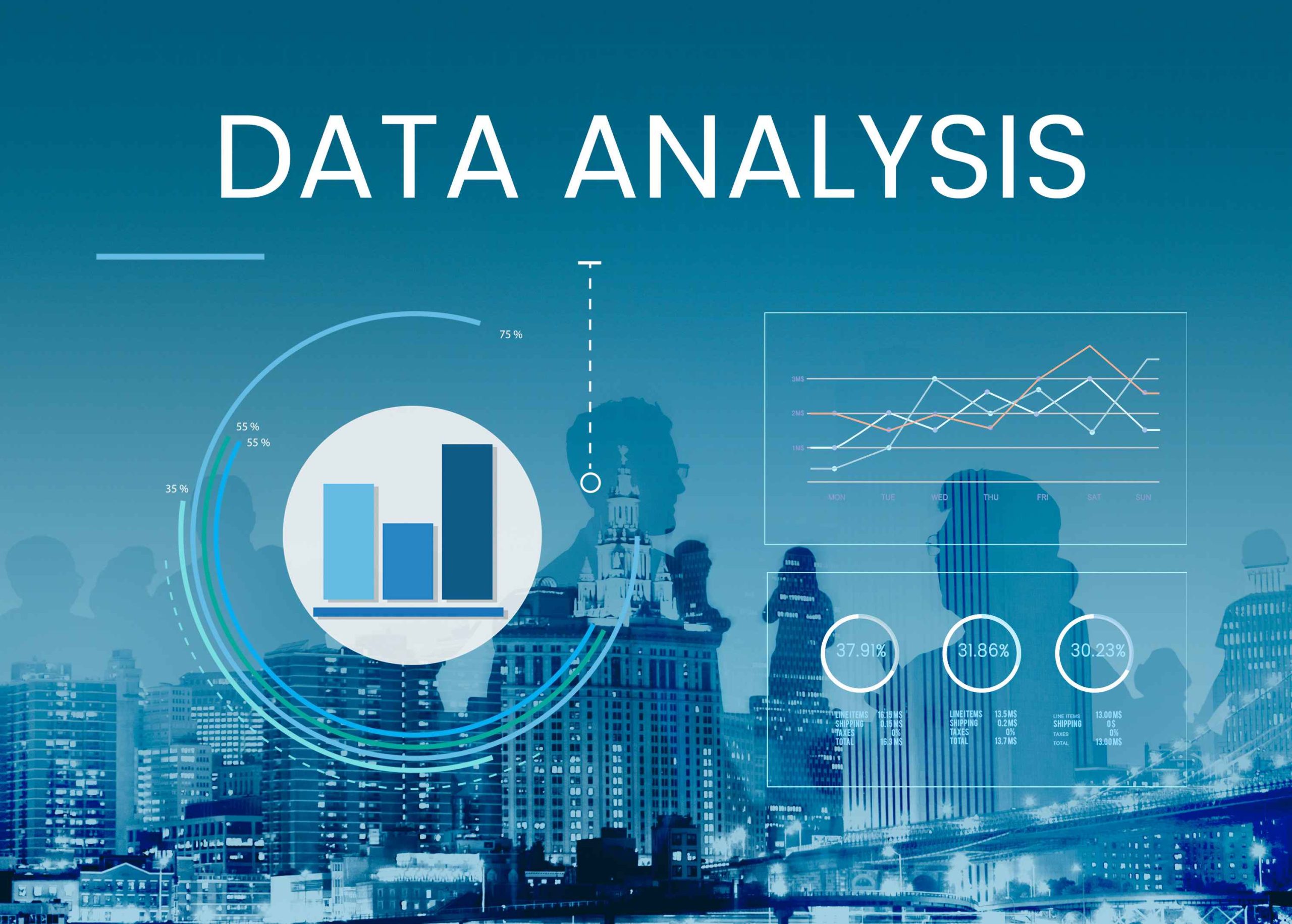Data Analytics and Its Contribution in Business

Data Analytics is a multifaceted process that involves collecting, processing, and analyzing large volumes of data to uncover valuable information and insights. It utilizes statistical, mathematical, and computational techniques to transform raw data into meaningful patterns, trends, and correlations. The goal is to gain a deeper understanding of the data and use that knowledge to make informed decisions.
In business, Data Analytics plays a crucial role in decision-making processes. Here’s how it contributes to business decision-making in detail:
- Identifying Opportunities and Trends: Data Analytics allows businesses to identify emerging trends, patterns, and opportunities in their data. By analyzing historical data and real-time information, businesses can spot market trends, customer preferences, and potential areas for growth and innovation.
- Improving Operational Efficiency: Data Analytics helps optimize business processes by identifying inefficiencies and bottlenecks. By analyzing operational data, businesses can streamline workflows, allocate resources more effectively, and improve overall efficiency, leading to cost savings and increased productivity.
- Understanding Customer Behavior: Data Analytics enables businesses to gain valuable insights into customer behavior and preferences. By analyzing customer data, businesses can understand what drives their buying decisions, personalize their offerings, and tailor marketing strategies to target specific customer segments more effectively.
- Data-Driven Decision Making: With the help of Data Analytics, businesses can move away from relying solely on intuition or gut feelings when making decisions. Instead, they can base their choices on empirical evidence and data-backed insights, reducing the risk of making uninformed or misguided decisions.
- Predictive Analytics: Data Analytics includes predictive modeling, which allows businesses to forecast future trends and outcomes. By analyzing historical data and identifying patterns, businesses can predict customer behavior, market trends, demand fluctuations, and other crucial factors that influence business operations.
- Risk Management: Data Analytics helps businesses in risk assessment and management. By analyzing historical data and market conditions, businesses can identify potential risks and proactively mitigate them. This is particularly important in industries such as finance and insurance, where managing risks is a critical aspect of business success.
- Competitive Advantage: Businesses that effectively leverage Data Analytics gain a competitive edge in the market. By making data-driven decisions, they can respond faster to changing market conditions, anticipate customer needs, and outperform competitors who rely solely on traditional decision-making methods.
- Enhanced Customer Experience: Data Analytics allows businesses to create a more personalized and tailored customer experience. By analyzing customer data and behavior, businesses can offer personalized product recommendations, targeted marketing campaigns, and better customer support, leading to higher customer satisfaction and loyalty.
Key Steps of a Typical Data Analytics Consulting Project
A typical Data Analytics Consulting project involves several key steps to ensure a successful and effective outcome. These steps may vary depending on the project’s scope and complexity, but the fundamental stages include:
- Project Definition and Scope: This initial step involves understanding the client’s objectives, challenges, and desired outcomes. The consultant works closely with the client to define the project’s scope, establish clear goals, and identify key performance indicators (KPIs) that will measure the project’s success.
- Data Collection and Preparation: Data is the foundation of any data analytics project. In this step, the consultant gathers relevant data from various sources, including structured databases, unstructured text, or external data sets. The collected data is then cleaned, transformed, and prepared for analysis to ensure its accuracy and consistency.
- Exploratory Data Analysis (EDA): EDA is a critical step that involves exploring the data to understand its characteristics, patterns, and relationships. Data visualization techniques are often used to gain insights and identify potential trends or outliers relevant to the project’s objectives.
- Data Modeling and Analysis: In this stage, the consultant selects appropriate data analysis techniques and models based on the project’s goals. This may include descriptive analytics (summarizing data), predictive analytics (making predictions), or prescriptive analytics (optimizing decisions). Statistical methods and machine learning algorithms are commonly used for data modeling and analysis.
- Interpretation of Results: Once the analysis is complete, the data analytics consultant interprets the findings and translates them into meaningful insights for the client. The results are aligned with the project’s initial objectives, and the consultant identifies actionable recommendations based on the data-driven insights.
- Data Visualization and Reporting: To communicate the results effectively, the consultant creates visualizations and reports that convey complex information clearly and understandably. Visualizations such as charts, graphs, and dashboards are used to present the insights to stakeholders.
- Implementation and Integration: If the project involves the development of new data-driven systems or tools, the consultant works with the client to implement and integrate these solutions into the existing infrastructure.
- Ongoing Monitoring and Support: Data Analysis Consulting is not a one-time event; it involves continuous monitoring to assess the effectiveness of implemented solutions. The consultant provides ongoing support to ensure the data analytics solutions remain relevant and deliver value over time.
- Knowledge Transfer: Throughout the project, the consultant shares knowledge and best practices with the client’s team, empowering them to leverage data analytics effectively in their future endeavors.
Data Analytics Consulting projects can successfully guide organizations towards data-driven decision-making and strategic improvements by following these key steps.
Role of Machine Learning in Data Analytics Consulting
Machine learning plays a vital role in Data Analytics Consulting, enabling consultants to extract valuable insights and patterns from large and complex datasets. It is a subset of artificial intelligence that focuses on training algorithms to learn from data and make predictions or decisions without explicit programming.
In Data Analytics consulting, machine learning is applied in various ways:
- Predictive Analytics: Consultants use machine learning algorithms to make predictions based on historical data. For example, machine learning models can forecast stock prices or credit risk in finance. In marketing, predictive models can identify potential high-value customers.
- Pattern Recognition: Machine learning helps identify patterns and trends in data that may not be evident through traditional analysis. It can recognize anomalies or unusual behaviors that may indicate potential fraud or unusual customer behavior.
- Personalization: In e-commerce and marketing, machine learning creates personalized customer recommendations based on their past behavior and preferences. This helps in improving customer experience and increasing conversion rates.
- Natural Language Processing (NLP): NLP, a subfield of machine learning, is used to analyze and understand human language. It enables sentiment analysis, chatbots, and automatic categorization of unstructured text data.
- Image and Speech Recognition: Machine learning is employed to recognize and classify images, enabling applications in fields like healthcare for medical image analysis or in self-driving cars for object detection.
- Optimization: Machine learning can optimize processes, such as supply chain management or resource allocation, by analyzing historical data and identifying efficient strategies.
- Clustering and Segmentation: Data Analytics consultants use machine learning algorithms to group data into clusters or segments based on similarities. This helps in market segmentation, customer segmentation, and targeted marketing strategies.
- Recommender Systems: Machine learning powers recommender systems used by platforms like Amazon and Netflix to suggest products or movies based on users’ past behavior.
In practice, Data Analytics Consulting firms use machine learning libraries and frameworks like TensorFlow, scikit-learn, or PyTorch to implement various algorithms. The consultants first understand the problem domain, select the appropriate machine learning models, preprocess the data, and train the models using historical data. They then fine-tune the models, validate their performance, and deploy them in real-world applications.
Ethical Considerations for Sensitive Data in Data Analytics Consulting Projects
When working with sensitive data in Data Analytics Consulting projects, several ethical considerations must be taken into account to ensure the responsible and ethical use of the information. Some key considerations include:
- Data Privacy and Security: Ensuring the confidentiality and security of sensitive data is paramount. Consultants must implement robust data encryption, access controls, and other security measures to prevent unauthorized access and data breaches.
- Informed Consent: Data Analytics Consulting firms should obtain informed consent from individuals whose data is being used for analysis. Transparent communication about data usage and the purpose of the analysis is essential to establish trust and compliance with privacy regulations.
- Anonymization and De-identification: Consultants should anonymize or de-identify data to remove any personally identifiable information. This helps protect the privacy of individuals and reduces the risk of data re-identification.
- Data Minimization: Consultants should only collect and use the minimum amount of data necessary for the analysis. Limiting data collection to relevant and essential information helps reduce privacy risks and ensures compliance with data protection regulations.
- Fairness and Bias: Data Analytics Consulting projects should strive to eliminate bias and ensure fairness in data analysis. Bias in data or algorithms can lead to discriminatory outcomes, impacting certain groups unfairly.
- Consent Withdrawal and Data Retention: Individuals should have the right to withdraw their consent for data usage at any time. Consultants should also have a clear data retention policy to avoid unnecessary storage of sensitive information.
- Data Ownership and Intellectual Property: Consultants should clearly define data ownership and intellectual property rights in the project contract to avoid any disputes over data usage and ownership.
- Compliance with Regulations: Data Analytics Consulting firms must comply with relevant data protection laws and regulations, such as GDPR (General Data Protection Regulation) or CCPA (California Consumer Privacy Act), depending on the jurisdiction.
- Transparency in Data Usage: Consultants should be transparent about how the data will be used, the analysis methods employed, and the potential implications of the findings.
- Accountability: Data Analytics Consulting firms should take responsibility for the ethical use of data and ensure that all team members adhere to ethical guidelines throughout the project.
- Data Sharing and Third-Party Agreements: If data is shared with third-party partners or vendors, consultants must ensure that these parties also adhere to the same ethical standards and data protection practices.
By prioritizing these ethical considerations, Data Analytics Consulting firms can build trust with their clients and stakeholders, protect individuals’ privacy, and uphold the integrity of their data-driven projects. Ethical data practices are crucial for maintaining a positive reputation, compliance with regulations, and the long-term success of the consulting business.
Challenges of Implementing Data-driven Strategies with Data Analytics Consulting
Implementing data-driven strategies with the help of Data Analytics Consulting can present several challenges for organizations. Some of the primary challenges include:
- Data Quality and Accessibility: Organizations often struggle with the quality and accessibility of their data. Incomplete, inaccurate, or inconsistent data can lead to unreliable insights and hinder the effectiveness of data-driven strategies.
- Data Integration: Organizations may store data in various systems and formats, making it challenging to integrate and analyze data from different sources cohesively. Data integration issues can lead to siloed data and incomplete business views.
- Technical Expertise and Resources: Implementing data-driven strategies requires a skilled team with data analytics, machine learning, and data engineering expertise. Many organizations may lack the necessary talent or resources to leverage data analytics solutions fully.
- Change Management: Adopting data-driven strategies often requires a cultural shift within the organization. Employees and management must embrace data-driven decision-making, which can be met with resistance and require change management efforts.
- Data Security and Privacy: Handling sensitive data requires robust security measures to protect against data breaches and ensure compliance with data privacy regulations. Organizations must address concerns about data security to build trust with stakeholders.
- Cost and ROI: Implementing data analytics solutions can involve significant upfront costs, including software, hardware, and talent acquisition. Organizations must carefully assess the potential return on investment (ROI) to justify these expenses.
- Scalability: As the organization’s data volume and complexity grow, the data analytics infrastructure must be scalable to handle the increasing demands. Scaling data analytics solutions effectively can be a challenging task.
- Interpretation and Communication of Insights: Extracting insights from data is only valuable if decision-makers effectively communicate and understand these insights. Data Analytics Consulting firms must bridge the gap between technical jargon and business language to ensure insights are actionable.
- Time Constraints: Implementing data-driven strategies may require significant time and effort to collect, analyze, and interpret data. Organizations may struggle to keep up with real-time data analysis consulting and decision-making in fast-paced industries.
- Data Governance and Compliance: Clear data governance policies and compliance with relevant regulations are critical for ensuring ethical data usage. Organizations must address compliance issues and align data practices with legal requirements.
Key Differences Between Descriptive, Predictive, and Prescriptive Analytics

In the context of Data Analytics Consulting, the key differences between descriptive, predictive, and prescriptive analytics are as follows:
Descriptive Analytics:
Descriptive analytics summarizes historical data to gain insights into past events and trends. It involves using data visualization, charts, and reports to show what has happened in the past clearly. The main objective of descriptive analytics is to answer questions like “What happened?” and “What are the current trends?”
Example: A Data Analytics Consulting project might involve analyzing sales data to visualize revenue trends over the past year.
Predictive Analytics:
Predictive analytics forecasts future outcomes and trends based on historical data patterns and statistical algorithms. It uses machine learning models to make predictions and identify potential future scenarios. The primary question addressed by predictive analytics is “What is likely to happen in the future?”
Example: In a Data Analytics Consulting project for a retail company, predictive analytics can be used to forecast customer demand for specific products during upcoming seasons.
Prescriptive Analytics:
Prescriptive analytics goes beyond descriptive and predictive analytics by providing insights into what might happen in the future and recommending the best course of action to achieve a particular outcome. Optimization techniques and decision models are used to suggest the most favorable actions to maximize the desired results. The key question prescriptive analytics answers is, “What should we do to achieve the best possible outcome?”
Example: A Data Analytics Consulting project for a logistics company might use prescriptive analytics to optimize delivery routes, considering factors such as traffic, weather, and delivery time windows to minimize transportation costs.




